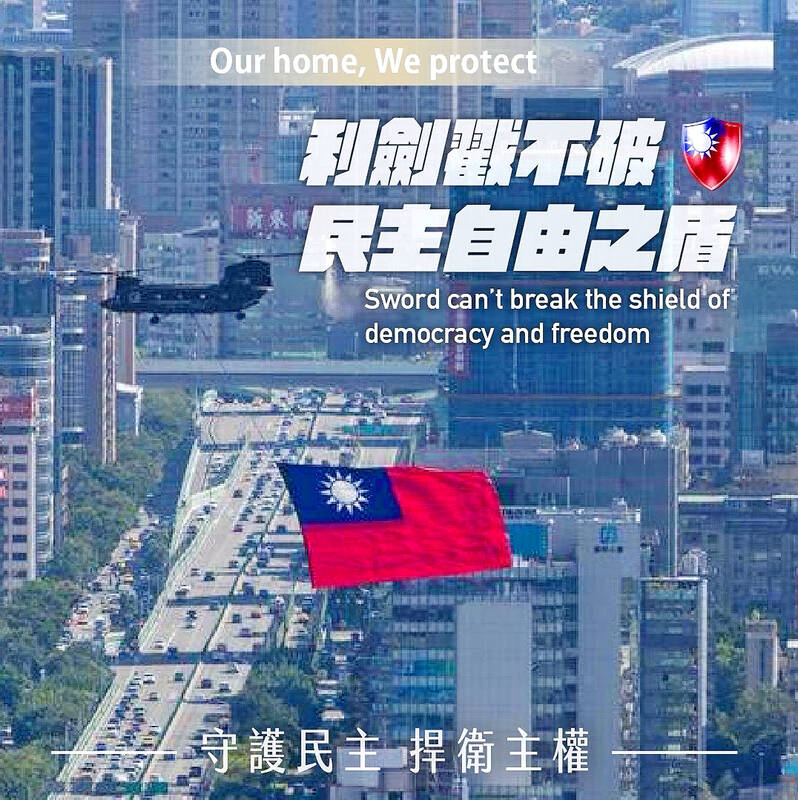Countries that would get involved in a Taiwan-China conflict should take steps to counter Beijing’s propaganda which says that China would not be defeated, a US military official wrote in a research paper.
Chinese propaganda on social media, along with the expansion of its military, is intended to convey the message to countries friendly to Taiwan that they could not defeat China in a conflict, and therefore should not become involved, US Marine Corps Lieutenant Colonel Brian Kerg wrote.
Kerg, who wrote the paper for the Atlantic Council’s Scowcroft Center for Strategy and Security where he is a research fellow, said that China observers should see Beijing’s “Joint Sword-2024A” military exercises held last month from that perspective.

Photo courtesy of the Ministry of National Defense
China would have policymakers in the US and elsewhere believe that resistance to a Chinese occupation of Taiwan would be futile, and therefore they should seek to encourage Taiwan to accept “peaceful unification,” he said.
Analysis of the Chinese People’s Liberation Army shows that although China is a military threat, it is not as big of a threat as Beijing would have people believe through its propaganda, he said.
However, if Beijing influence campaigns helps to reinforce beliefs about its power, then China would achieve its aims without the need to engage in military conflict, he said.
To prevent that from happening, policymakers and analysts should understand the nature and depth of Beijing’s influence campaign, and be aware of its relative vulnerability in the event of an attempted invasion of Taiwan, he said.
Policymakers should also work to dispel misconceptions about the strength of China’s military power, he said.
Although Beijing likely has the air and sea capabilities to blockade Taiwan, maintaining the blockade might also be strategically detrimental to Beijing and would damage China’s economy, he said, adding that a complete and long-term blockade would put great pressure on China’s military.
An amphibious assault on Taiwan would be larger in scale and more complex than the Normandy landings during World War II, and would require joint planning and coordination on a level that the various branches of the People’s Liberation Army lack the capability for, he said.
Countering China’s narrative must be pre-emptive, and policymakers must emphasize China’s vulnerabilities, so as to strengthen public support for assisting Taiwan’s defense, he said.
The resilience of US alliances and partnerships against Chinese aggression must be demonstrated, as well as the efforts to improve the effectiveness of Taiwan’s overall defense, he added.
The Taiwanese government should also make efforts to protect its public from the influence of disinformation, for example by teaching media literacy skills in schools, he said.

Alain Robert, known as the "French Spider-Man," praised Alex Honnold as exceptionally well-prepared after the US climber completed a free solo ascent of Taipei 101 yesterday. Robert said Honnold's ascent of the 508m-tall skyscraper in just more than one-and-a-half hours without using safety ropes or equipment was a remarkable achievement. "This is my life," he said in an interview conducted in French, adding that he liked the feeling of being "on the edge of danger." The 63-year-old Frenchman climbed Taipei 101 using ropes in December 2004, taking about four hours to reach the top. On a one-to-10 scale of difficulty, Robert said Taipei 101

A preclearance service to facilitate entry for people traveling to select airports in Japan would be available from Thursday next week to Feb. 25 at Taiwan Taoyuan International Airport, Taoyuan International Airport Corp (TIAC) said on Tuesday. The service was first made available to Taiwanese travelers throughout the winter vacation of 2024 and during the Lunar New Year holiday. In addition to flights to the Japanese cities of Hakodate, Asahikawa, Akita, Sendai, Niigata, Okayama, Takamatsu, Kumamoto and Kagoshima, the service would be available to travelers to Kobe and Oita. The service can be accessed by passengers of 15 flight routes operated by

Taiwanese and US defense groups are collaborating to introduce deployable, semi-autonomous manufacturing systems for drones and components in a boost to the nation’s supply chain resilience. Taiwan’s G-Tech Optroelectronics Corp subsidiary GTOC and the US’ Aerkomm Inc on Friday announced an agreement with fellow US-based Firestorm Lab to adopt the latter’s xCell, a technology featuring 3D printers fitted in 6.1m container units. The systems enable aerial platforms and parts to be produced in high volumes from dispersed nodes capable of rapid redeployment, to minimize the risk of enemy strikes and to meet field requirements, they said. Firestorm chief technology officer Ian Muceus said

MORE FALL: An investigation into one of Xi’s key cronies, part of a broader ‘anti-corruption’ drive, indicates that he might have a deep distrust in the military, an expert said China’s latest military purge underscores systemic risks in its shift from collective leadership to sole rule under Chinese President Xi Jinping (習近平), and could disrupt its chain of command and military capabilities, a national security official said yesterday. If decisionmaking within the Chinese Communist Party has become “irrational” under one-man rule, the Taiwan Strait and the regional situation must be approached with extreme caution, given unforeseen risks, they added. The anonymous official made the remarks as China’s Central Military Commission Vice Chairman Zhang Youxia (張又俠) and Joint Staff Department Chief of Staff Liu Zhenli (劉振立) were reportedly being investigated for suspected “serious